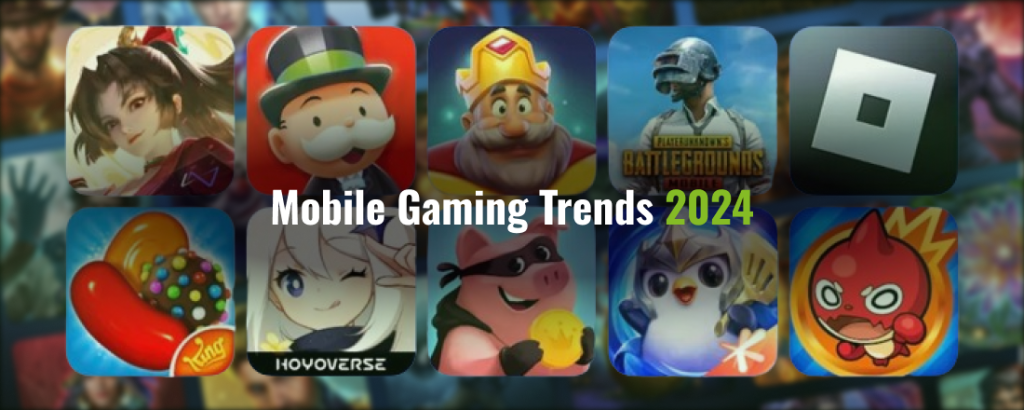Understanding the Role of AI: Mobile Gaming
May 1, 2024Top 10 Most popular mobile game in the world of 2024: The Evolution of Mobile Gaming
May 1, 2024
The world of mobile gaming is constantly evolving, and as we step into 2024, industry experts are predicting several key trends that will shape the landscape of mobile gaming in the coming year. These trends highlight the increasing role of technology, a focus on optimizing user experience, and the evolution of game genres. Let’s delve into these trends and explore what they mean for the mobile gaming industry.
- Tech’s Starring Role: Technology is set to take center stage in 2024, with more developers and publishers utilizing software for various aspects of game development and marketing. In-app bidding, for example, will help test game marketability before publishing, ensuring that developers can make informed decisions about their games. Additionally, running campaigns through Connected TV (CTV) will open up new avenues for reaching audiences. Artificial Intelligence (AI) will also play a significant role, enhancing creativity and providing business support to game developers.
- Optimizing the Ad Experience: User experience (UX) is a crucial aspect of mobile gaming, and in 2024, there will be a strong emphasis on improving the ad experience for players. Developers and publishers will rethink ad timing and frequency to ensure that ads seamlessly integrate into the gaming experience without disrupting gameplay. A data-centric approach will be adopted to ensure high-quality, relevant ads that enhance the overall user experience.
- Evolution of Hyper-Casual Games and Hybridization: Hyper-casual games have gained tremendous popularity in recent years due to their simple yet addictive gameplay. In 2024, developers will focus on adding depth and progression to hyper-casual games in order to retain quality users for longer periods. Additionally, there will be a rise in the launch of hybrid-casual games that combine elements of both hyper-casual and traditional casual games, offering players a more varied and immersive gaming experience.
- Puzzles for the Win: The puzzle game sub-genre will continue to thrive in 2024, with developers focusing on effective monetization and user acquisition strategies. Puzzle games have proven to be highly engaging and profitable, and developers will leverage this trend by creating innovative and challenging puzzles that captivate players and drive revenue.
- User-Initiated Ad Formats and In-App Purchases (IAPs): Developers are embracing user-initiated ad formats as part of their monetization strategies. This approach allows non-paying users to engage with ads voluntarily, leading to increased in-app purchases and overall user engagement. By integrating these user-initiated ad formats, developers can strike a balance between monetization and user satisfaction, enhancing the overall gaming experience.
- Market Rebound Expectation: Industry experts anticipate significant growth in the mobile gaming industry in 2024. With the emergence of new studios, increased investment in user acquisition, and an industry-wide resurgence, there is optimism for a thriving mobile gaming market. As technology continues to advance and player preferences evolve, the industry is poised for continued success and innovation.
These trends highlight the tech-driven and user-centric nature of the mobile gaming industry in 2024. With a focus on leveraging technology, optimizing user experience, and anticipating market growth, developers and publishers are poised to create captivating and immersive gaming experiences that will delight players around the world. As we enter the new year, the future of mobile gaming looks brighter than ever, promising exciting innovations and endless entertainment for gamers of all ages.
First, let’s define generative AI. It utilizes neural networks like GANs (Generative Adversarial Networks) to create diverse content such as text, images, and audio from large datasets. This enables game developers to generate dynamic and ever-changing game worlds, offering limitless replayability and adaptability.
The impact of generative AI on the gaming industry is significant. It allows for procedural content generation (PCG) which creates game content algorithmically. This means that game worlds are not static but rather generated on the fly, providing players with unique experiences every time they play. This enhances replay value and player engagement, as no two playthroughs are the same.
Moreover, generative AI has led to the market growth of AI-powered mobile gaming. According to Market Research.Biz, the generative AI in gaming market is projected to reach USD 7,105.4 million by 2032 with a 23.3% compound annual growth rate (CAGR). This showcases the increasing demand for AI-driven gaming experiences and the potential for further growth in the industry.
Looking ahead, there are several upcoming trends in AI-powered mobile gaming. Procedural Content Generation (PCG) will continue to evolve, allowing game developers to create vast and dynamic game worlds. AI-driven non-player characters (NPCs) will become more intelligent and responsive, providing more immersive gameplay. Personalized gameplay experiences will be tailored to individual players’ preferences and behaviors. Realistic graphics powered by AI algorithms will create visually stunning mobile games. Lastly, adaptive difficulty will ensure that games adjust their level of challenge based on player performance, providing a more balanced and enjoyable gaming experience.
However, there are also challenges associated with generative AI in mobile gaming. Computational intensity is a concern, as AI algorithms require significant processing power. Data curation is crucial to ensure that the AI models are trained on high-quality datasets. Balancing the generated content to avoid repetitive or biased outcomes is also a challenge. Overfitting, where the AI model becomes too specialized and fails to generalize well, needs to be addressed. Additionally, maintaining a positive player experience and mitigating bias in AI-generated content are ongoing challenges that need careful consideration.
Lastly, let’s address some common questions about AI in gaming. Can AI play games? Yes, AI algorithms can learn to play games and even surpass human performance in certain cases. Some popular AI-generated games include “Angry Birds AI” and “Super Mario AI.” Tools like Unity ML-Agents and DeepMind Lab are widely used in the industry to develop AI-powered games and simulations.
In conclusion, generative AI is revolutionizing game development in the mobile gaming industry. Its ability to autonomously create diverse and dynamic content is driving unprecedented growth and innovation. As the industry continues to evolve, we can expect AI-powered mobile games to offer immersive experiences that adapt to player preferences and behaviors. Embracing generative AI techniques opens up a world of possibilities for game developers and players alike.


